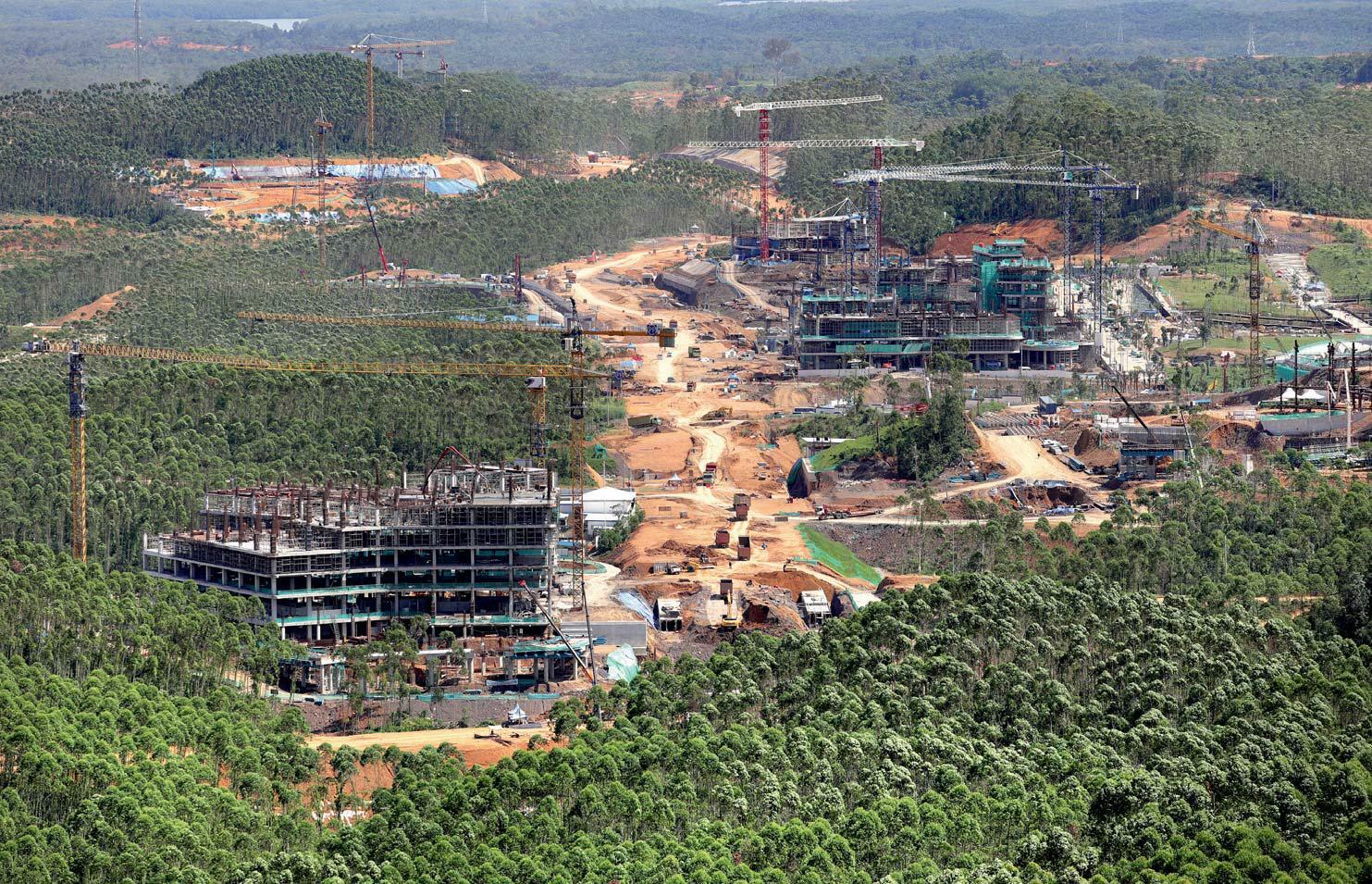
In eastern Borneo, beyond the thick jungle forests, an epic building project is under way. Giant trucks, cement mixers and diggers lumber along battered roads. Cranes tower overhead. Yellow dust clouds the air, caking everything in reach: the leaves of eucalyptus trees, the sides of passing vehicles and the homes of nearby residents.
This site a 2,560 sq km area encompassing industrial plantations, mines, Indigenous communities and agricultural land-is to form Nusantara, Indonesia's new administrative capital.
The decision to move the capital to a new site was taken because Jakarta is rapidly sinking. In a single year, some areas of the capital subside by as much to 11cm, a problem driven by excessive groundwater extraction and rapid urban development. On top of this, the climate crisis is making storm surges and extreme weather more likely, and causing sea levels to rise.
By 2050, about 25% of the capital could be submerged if there is no effective action, according to a study by the government's National Research and Innovation Agency.
Nusantara's location, in the province of East Kalimantan, means the new capital will be at the centre of Indonesia's archipelago of 17,000 islands, to help spread power and wealth more evenly across the country.
The development is welcomed by many in the wider province, who hope it will bring investment and better infrastructure. Officials promise the capital will be a modern, sustainable forest city that coexists with nature and is carbon neutral by 2045.
However, critics say the development is too ambitious and rushed. They also warn it could come with high costs, not only to the state - which will fund 20% of the $32bn bill - but also to the surrounding environment and local Indigenous communities.
This story is from the April 05, 2024 edition of The Guardian Weekly.
Start your 7-day Magzter GOLD free trial to access thousands of curated premium stories, and 9,000+ magazines and newspapers.
Already a subscriber ? Sign In
This story is from the April 05, 2024 edition of The Guardian Weekly.
Start your 7-day Magzter GOLD free trial to access thousands of curated premium stories, and 9,000+ magazines and newspapers.
Already a subscriber? Sign In

The Saudi football World Cup is an act of violence and disdain
Well, that's that then. In the event there were only two notes of jeopardy around Fifa's extraordinary virtual congress last week to announce the winning mono-bids, the vote without a vote, for the right to host the 2030 and 2034 football World Cups.

AI has made the move into video and it's worryingly plausible
I recently had the opportunity to see a demo of Sora, OpenAI's video generation tool, which was released in the US last Monday, and it was so impressive it made me worried for the future.

With tyrant Assad ousted, Syrians deserve support and hope
Last week, time collapsed. Bashar al-Assad's fall recalled scenes across the region from the start of the Arab spring almost 14 years ago. Suddenly history felt vivid, its memories sharpened. In fact it no longer felt like history.

TV
The Guardian Weekly team reveals our small-screen picks of the year, from the underground vaults of post-apocalyptic Fallout to the mile-high escapism of Rivals

Albums
Murky love stories, nostalgic pop and an in-your-face masterpiece captured our critics' ears in 2024

Film
Visual language, sound, light and rhythm are to the fore in the best movies of the year

Hidden delights Our 24 travel finds of 2024
Guardian travel writers share their discoveries of the year, from Læsø to Lazio

'It's really a disaster' The fight to save lives as gang war consumes capital
Dr James Gana stepped out on to the balcony of his hospital overlooking a city under siege. \"There's a sensation of 'What's next?'. Desperation is definitely present,\" the Médecins Sans Frontières (MSF) medic said, as he stared down at one of scores of camps for displaced Haitians in their country's violence-plagued capital.

Trailblazers The inspiring people we met around the world this year
From an exuberant mountaineer to a woman defiantly facing the guns of war, here are some of the brave individuals who gave us hope in a tumultuous 2024

Votes of confidence
From India to Venezuela and Senegal to the US, more people voted this year than ever before, with over 80 elections across the world. With rising authoritarianism and citizen-led resistance revealing its vulnerabilities and resilience in the face of unprecedented challenges, has democracy reached its breaking or turning point?